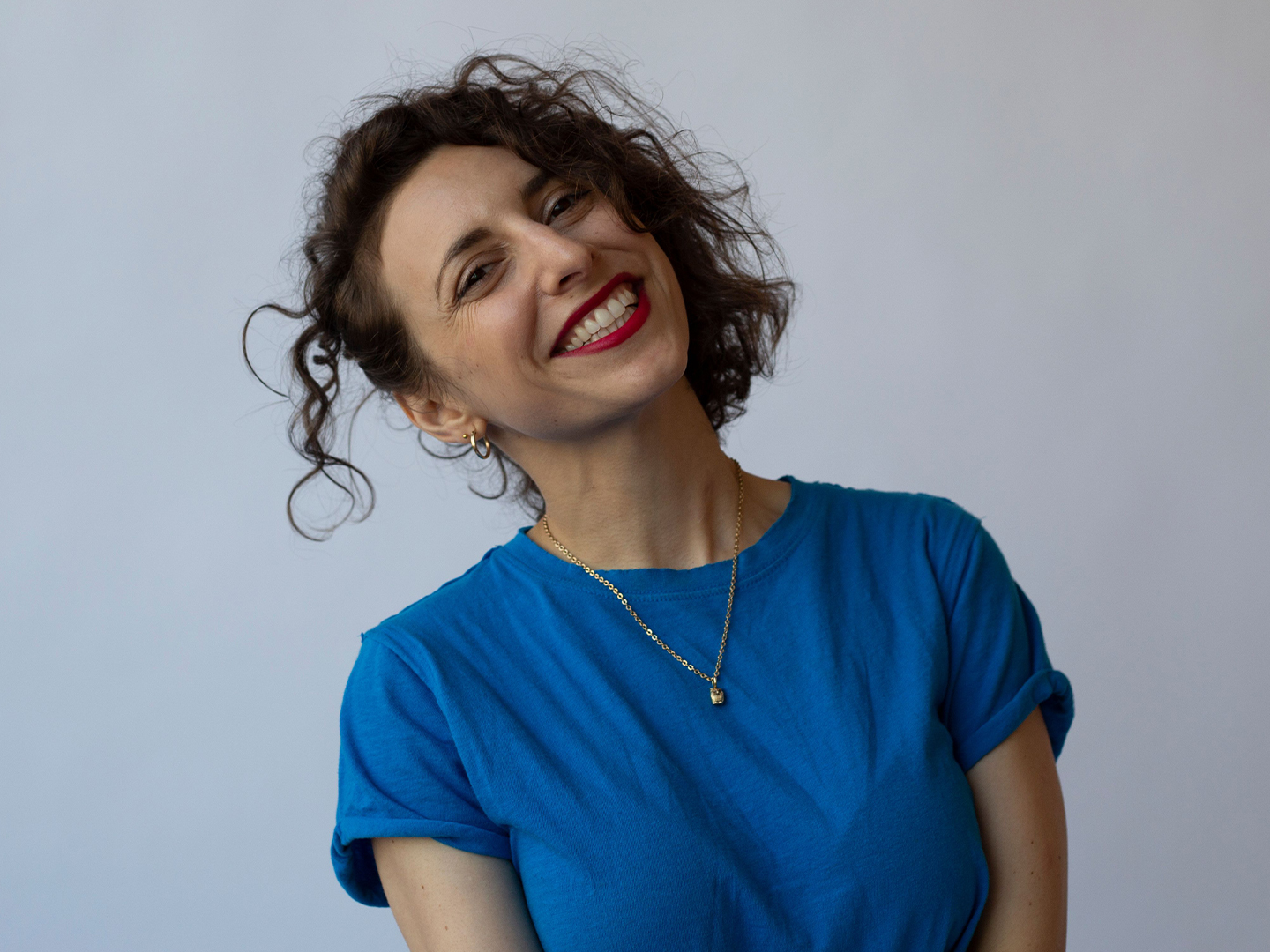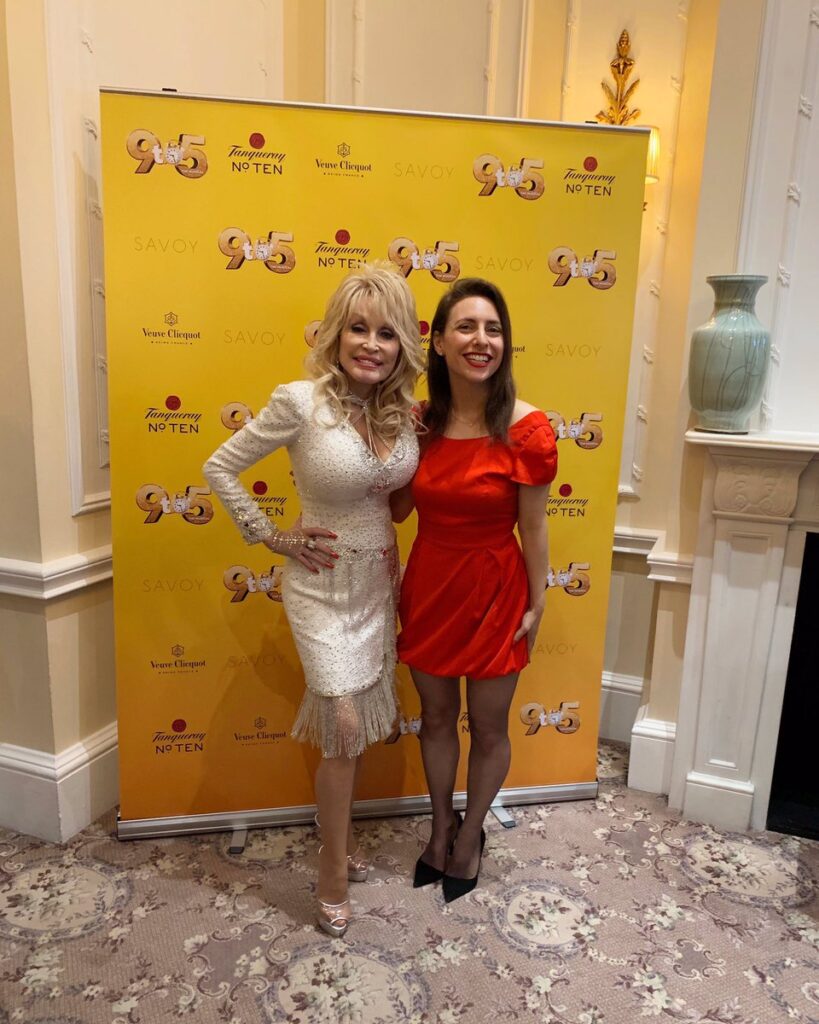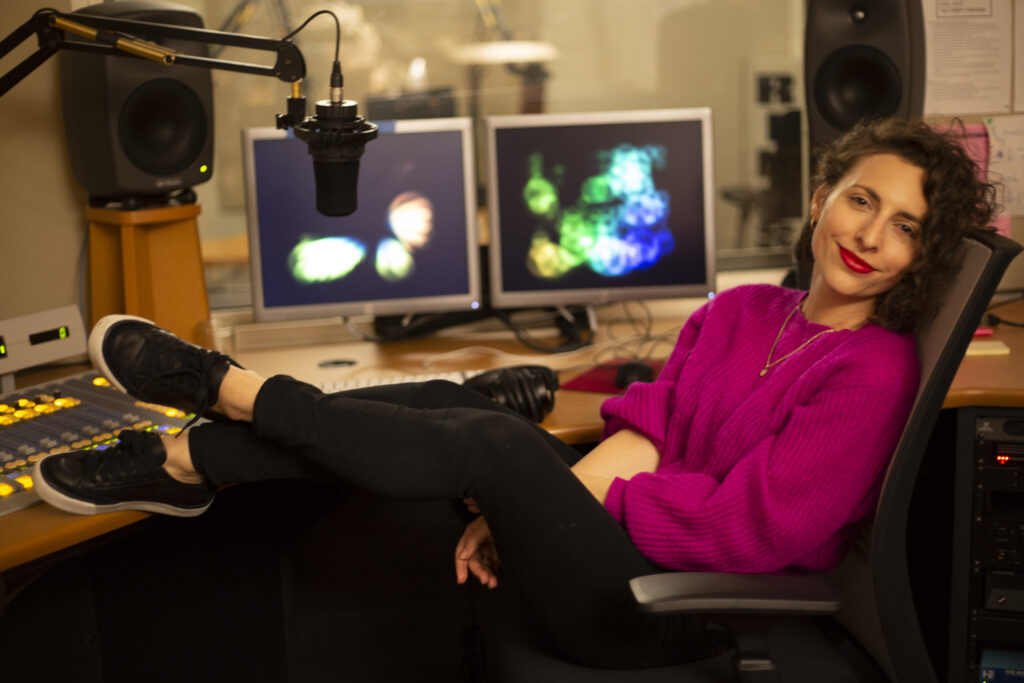
Teen Dreams Realized
By Julie Riggott
Award-winning podcaster Shima Oliaee (’05) talks about her latest series on teen girls, and how she made it as an artist.

For Shima Oliaee (’05), it’s been a journey to finding herself. A first-generation Middle Eastern American who grew up in Reno, Nevada, she was a classically trained singer and determined to make it in music.
Twenty years on, Oliaee has an enviable resume and some prestigious awards. She worked on the Golden Globe-winning Brooklyn Nine-Nine, and she’s better known as a multiple-award-winning podcaster who earned a Peabody for her Dolly Parton’s America series.
While working on her latest podcast, The Competition, she revisited her teen dreams and her ambitious efforts to pay her way through college. The six-part audio series, which launched on April 29, takes listeners behind the scenes of the Distinguished Young Women (DYW) program (formerly America’s Junior Miss), one of the most lucrative scholarship competitions for high school girls. Since 1958, each year after the state competitions, 50 winners move on to the national finals in Mobile, Alabama. Oliaee was Nevada’s winner in 2001 and received the scholastics award at nationals. Given her success since then, she was asked to return as a judge for the nationals in 2022. She brought two producers with her.
“You get a very up-close look at a very high-stress competition, where girls leave their homes, sometimes for the first time in their entire lives, for two weeks, to compete against each other for huge cash prizes. And they’re all girls who are used to being the best of the best, and so usually, for most of them, this is their first big loss,” Oliaee said. “We really looked at what it means to be a winner or loser, and what girls and women have to do to survive in the world.”
Oliaee and her team also followed seven girls for a year and a half after the competition, looking at how the competition impacted their trajectory. She said the teens were diverse in every way — their background, personality, viewpoints — but they were all ambitious and smart. “They’re all big dreamers,” Oliaee said.
Fortuitously timed with the explosion of what Oliaee calls “girl world,” including Barbie and Taylor Swift’s Eras Tour, the project also gave Oliaee occasion to reflect on her own experience as a millennial teenager and self-described “bookworm who was really seeking a way to express myself and make some meaning out of life.”
“It was a journey to remind myself who that girl was before she left home for USC,” she said. “I thought I had to have it all figured out at a very young age, but USC showed me that maybe that’s not true. For the series, I was very interested in what this competition says about how we’re setting up girls for success or failure. They all feel that if they win the competition, things will be figured out, but we know as adults that the working world is not that simple, and unfortunately, a lot of society is set up to stop a woman from achieving her dreams.”
Soaking Up Knowledge

For Oliaee, as a teen, her future was always going to be in music.
“Music felt really powerful,” she said. “I wanted to change the world, and to me music was the way. I saw strong women in music with big personalities, and I felt it was the best way to be a grown woman, was to be an artist.”
In fourth grade, watching the movie The Bodyguard in a theater made a huge impression. “This might seem surprising, but the film was really ahead of its time. Houston’s character is a single mother. She’s a pop icon. She has a big personality and she’s forthright and strong. I was in love. I thought, ‘That is exactly how I want to be. I want to be that big and free.’”
By the time Oliaee was a senior in high school, she was winning awards as a singer, writing songs and accompanying herself on piano. The only problem was her parents were dead set against it.
“My parents did not want me to become a musician. It was their worst nightmare come true. They’re immigrants and fled their home country as teenagers. I was a straight A student, ranked first in my class, and they thought I was throwing away my life.”
So, Oliaee had to figure out how to get to college on her own terms. A friend from her high school swim team, who was a year ahead of her and already at USC Thornton, told her that if she won the full merit scholarship at USC, she could use it for any major.
So when she got to USC, she switched majors and took all music industry, theater and cinema classes that semester. “It felt like the most exciting thing that had ever happened to me.”
Oliaee still fondly recalls taking classes with professors like Dick McIlvery, and a class with Bill Biersach where she composed a synthesizer version of “Eleanor Rigby.” She learned ProTools and took cinema classes for a minor, all of which came in handy in her career. “I was a sponge,” she said. “A songwriting teacher said to us, ‘You can only put out what you put in.’ I use that all the time in my art now, in my journalism, in podcasts. I try to soak up as much art, nonfiction reading and literature that I can. I wanted to know so much at such a young age so that I could be the artist I wanted to be. What I had yet to gain were the many painful life experiences yet to come. That’s what forged me, though, to the human I am today.”

Comedy TV and Podcasting
After graduation, Oliaee tried many things to see what fit. She worked at a recording studio, took up electric guitar, taught second grade, got a master’s degree in psychology, translated for peace conferences and gatherings at the United Nations. At that point she began to believe that education was the only way to truly make an impact and change society. So she began applying for a Ph.D. at Teachers College at Columbia University until a chance encounter turned her to hidden dreams in comedy.
“By chance, I bumped into a comedy television showrunner in Santa Monica, and I told her my fellowship at a nonprofit was ending and I was a little lost but planning to leave for school. She told me her TV show had just been greenlit by Warner Brothers that day, and she’d be happy to forward my resume to others she knew in the industry.”
Six weeks later, the woman offered her a job working in the comedy writing room for her show, Are You There, Chelsea?
“When I arrived the first day, I discovered we were filming on the Seinfeld stage, and it was a full circle moment for me. As a kid, my closest friends used to call me Elaine because I had big curly hair and was outspoken and unafraid,” she said. “I remember after that first week at work on the lot, I was like, ‘These people are totally weird, and they totally get me.’ I felt like I had come home.
“But also, I quickly discovered that everyone who had a job on the show had a dad or a relative working in the industry,” she added. “I realized how impossible it was for someone like me to be there.”
When the show got canceled after one season, it was a hard time financially. “I remember I lost a dollar on the way to 7-Eleven and I cried. I was still doing improv at the Groundlings and UCB but it felt like I might never figure it out. I worked any job that came to me to survive.”
But a series of events landed her a spot at Brooklyn Nine-Nine, when a TV producer who worked for the comedy Parks and Recreation, recommended her for the gig.
“Again, it felt like my world changed,” she said. “And the people that I met there are also my cheerleaders now, like the brilliant [writer and producer] Prentice Penny, who happens to also be a USC alum.”
In 2016, after four seasons, her dreams began to shift. “Watching the U.S. Presidential election debates leading up to that November election, I felt like I should be doing more, and for me at the time, I felt like working for a political comedy show, like Last Week Tonight with John Oliver, would be the new dream. I also felt so stuck in L.A.,” She said. “I knew I was playing it safe, so I decided to bet on myself and moved to New York City, a dream I’d had since I was really young.”
To her surprise, instead of a gig in television, she ended up getting a job at WNYC’s Radiolab, where she served as a researcher for the podcast’s hosts. Her first year there, however, a comedy pilot she penned got a lot of studio interest, so she was flying back and forth between New York and Los Angeles, thinking she would finish a year at Radiolab and go back to her “real dream.” During that time she reported and produced a series on sexual consent called In the No, but something else happened that changed her career trajectory. A host overbooked himself and needed her to serve as lead producer on an independent series he’d signed on to but didn’t have time to work on. Oliaee wanted to make sure she didn’t fail the people whose stories they were telling.
“That’s when everything I learned in comedy and television, even working in nonprofit orgs or as a teacher, finally came to aid me,” she said. “I was able to do many things at once without letting one thing drop. Even my graduate studies in psychology served me in interviews to help people share stories they’d never shared with anyone. The many books I’d read searching for answers to the problems of the world made me an excellent researcher. I had so much passion for the work, it was so meaningful to me, and I was back in audio, where I started at USC.”
That series, UnErased: The History of Conversion Therapy in America, for which she was credited as reporter, writer and producer, was named Best Podcast of 2018 by KQED News.
With that success, she was tapped for more, independently creating, reporting and producing the Peabody Award-winning 2019 series, Dolly Parton’s America, which looked at the country music icon as a unifying presence in divisive times, but also includes some of Oliaee’s own experiences with her Middle Eastern heritage and her experiences in the music industry. While doing research, she checked out a class called Dolly Parton’s America at the University of Tennessee at Knoxville and found an inspiration and a mentor in history professor Lynn Sacco, who got her Ph.D. at USC.
“Lynn is someone I still seek guidance from to this day,” she said. “She is a diamond of a human being. Just incredibly smart and wise and compassionate.”
Dolly Parton’s America was a major hit, winning not only a Peabody, but the Edward R. Murrow Award, First Place at the National Headliner Awards, Gold Award at the New York Festival of the Arts, an iheart Radio Award for Best Music Podcast, Webby Award for Best Podcast Series, Webby People’s Choice Award and Best Podcast of the Year by The New Yorker and Forbes.
Right after that she won a duPont Columbia award for creating, producing, reporting, and editing another audio documentary The Flag and the Fury about the controversy over the Mississippi state flag following George Floyd’s murder. She then created and co-hosted a series called The Vanishing of Harry Pace, about a forgotten Civil Rights figure who revolutionized American pop music, nominated for best audio doc at the International Documentary Awards.
With that success, she founded her own production company. She independently created, hosted, and executive produced Pink Card for ESPN’s 30 for 30, a series about three generations of Iranian women fighting for human rights and a way to change their country by risking their lives to attend soccer games. The latter earned her multiple awards, including the Edward R. Murrow Award for Excellence in Writing, Overseas Press Club honors, two Gracies for best audio producer and best sports podcast, a National Headliner Award, and two NY Festival of the Arts Awards. It was also an honoree at the International Women’s Podcast Awards and nominated for Podcast of the Year by the Podcast Academy (the Ambies). Adweek named Oliaee the Best Podcast Producer of 2023.
“Because I had to build my life from the bottom up, I got really fortunate in that I’ve met so many people from many walks of life, and I know them so deeply. It’s helped me see things, especially injustice, and unnecessary suffering, up close. I’ve shed a lot of tears, but it built in me a sense for what matters and a great instinct for thinking about and caring for others’ stories. I always think about the voices that have been silenced, the person the world is not built for,” she said of her work.
And now, thinking about how things have played out over the past 20 years, Oliaee said, yes, she has found her way and is happy to be making a difference.
“I started attending USC in 2001 as a Middle Eastern American woman,” she said. “My first month away from home, 9/11 happened. And no one spoke up against the war. To me the fact that there are so many today questioning the taking of life fills me with so much hope. I was forced to stay quiet so long about so many things, and I have many more dreams about how to speak up and be useful to the world. How I can help more people be heard. I feel like I’ve just begun.”



